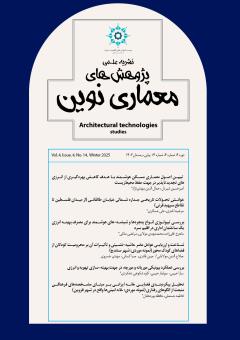تبیین اصول معماری مسکن هوشمند با هدف کاهش بهرهگیری از انرژیهای تجدید ناپذیر در جهت حفظ محیطزیست
محورهای موضوعی :
امیرحسین شیردل
1
![]() ,
جمال الدین مهدی نژاد
2
,
جمال الدین مهدی نژاد
2
1 - کارشناسی معماری، دانشکده معماری و شهرسازی، دانشگاه تربیت دبیر شهید رجایی، تهران، ایران.
2 - استاد دانشکده معماری، دانشکده مهندسی معماری و شهرسازی، دانشگاه تربیت دبیر شهید رجایی تهران.
کلید واژه: معماری پایدار, مسکن هوشمند, محیطزیست, بهینهسازی مصرف انرژی, انرژیهای تجدید پذیر.,
چکیده مقاله :
در دهههای اخیر، افزایش جمعیت کره زمین، گسترش شهرنشینی و توسعه صنعتی، بهرهبرداری غیراصولی و بیحد از منابع طبیعی بهشدت بر محیطزیست تأثیر گذاشته و منجر به بروز آسیبهای جدی زیستمحیطی شده است که تهدیدی جدی برای حیات آینده بشر و اکوسیستمهای طبیعی به شمار میروند. این وضعیت نشاندهنده ضرورت تغییر در رویکرد و نگرشها در معماری و لزوم حرکت بهسوی پایداری شده است. با افزایش چالشهای زیستمحیطی و نیاز به بهینهسازی مصرف منابع، ساختمانهای مسکونی هوشمند بهعنوان یک عاملی مهم برای ارتقاء معماری پایدار و حفظ محیطزیست مطرح شده است. این مقاله به بررسی راهکارهای نوین، جهت دستیابی به ساختمانهای مسکونی هوشمند میپردازد که میتواند به کاهش مصرف انرژی، بهینهسازی منابع طبیعی و بهبود کیفیت زندگی ساکنان منجر شود. ازاینرو این پژوهش که از نوع کیفی است، با بهرهگیری از روش توصیفی-تحلیلی و مطالعات کتابخانهای بهصورت هدفمند و همچنین جستوجوی منابع موجود در این حوزه اعم از مقالات، کتب و غیره نتایج مهمی حاصل گردیده است. نتایج پژوهش گویای آن است امروزه ساختمانهای هوشمند، در رسیدن به معماری و توسعه پایدار و در نتیجه حفظ محیطزیست نقش مؤثری را ایفا میکنند، ازاینرو، روشهایی همچون بهرهگیری از سیستمهای اتوماسیون خانگی، پیادهسازی فناوری اینترنت اشیاء (IOT)، استفاده از انرژیهای تجدید پذیر، طراحی فضاهای سبز و باغهای عمودی، توسعه مصالح ساختمانی پایدار، مدیریت هوشمند آب بهعنوان برجستهترین و مهمترین عوامل که در این حوزه مؤثر میباشند، پیشنهاد میگردد.
In recent decades, the increase in the planet’s population, the expansion of urbanization and industrial development, and the unprincipled and unlimited exploitation of natural resources have severely affected the environment, leading to serious environmental damage. The destruction of forests, air, water, and soil pollution, climate change, and the reduction of biodiversity are among the consequences of this process, which are considered a serious threat to the future of mankind and natural ecosystems. Today, this situation highlights the need to change approaches and attitudes in architecture and move towards sustainability. With the increase in environmental challenges and the need to optimize resource consumption, smart residential buildings have been proposed as an important factor for promoting sustainable architecture and preserving the environment. This article examines new solutions to achieve smart residential buildings that can reduce energy consumption, optimize natural resources, and improve the quality of life for residents. Therefore, this qualitative research, using the descriptive-analytical method and targeted library study, as well as searching for available resources in this field, has obtained important results from domestic and foreign articles, books, etc.The results of the research show that today, smart buildings play an effective role in achieving sustainable architecture and development, and thus preserving the environment. Therefore, methods such as utilizing home automation systems, implementing Internet of Things (IoT) technology, using renewable energy sources, designing green spaces and vertical gardens, developing sustainable building materials, and smart water management are proposed as the most prominent and important factors in this field.
